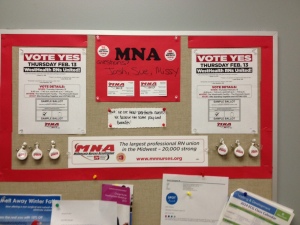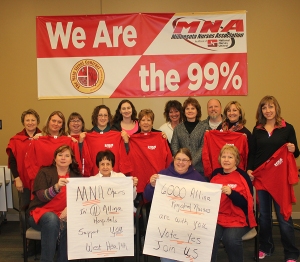With the clock ticking down on a final decision by the Obama administration on Keystone XL, it’s time to update why NNU is opposed to a project that looks more like a pathway to pollution than a gateway to our gas pumps.
Citing the threat to public health and how the project would hasten the climate crisis, nurses have been on the front line of protests against Keystone, a 1,700-mile pipeline that would transport 830,000 barrels of dirty tar sands oil every day from Alberta, Canada to U.S. Gulf Coast refineries, largely for export.
Here’s 10 reasons why:
1. No jobs on a dead planet
More jobs are certainly needed, but even the just concluded State Department assessment conceded Keystone would support only 35 post-construction jobs.
Infrastructure repair and promoting a green economy is a far better solution for the jobs crisis than a project that NASA scientist and climate expert James Hanson famously calls “game over” on the climate front.
If the threshold issue is jobs, nurses should support the pipeline as a full employment act in the volume of additional patients sickened by the pipeline’s health hazards and toll from accelerated climate change. But nurses see an inseparable link between environmental justice and the health of our communities and planet.
2. Don’t drink the water…
From the ground to the pipe to the refineries, Keystone’s tar sands oil, with its thick, dirty, corrosive properties, pose a far greater hazard than conventional oil – a major reason for National Nurses United and nurse opposition.
Toxic contaminants in the massive water needed for extraction are infecting clean water supplies with towns nearby Alberta experiencing spikes in cancer deaths, renal failure, lupus, and hyperthyroidism. Huge pipeline spills near Marshall, Mi. and Mayflower, Ar. have led to respiratory ailments and other health ills. Pollutants from tar sands refineries are linked to heart and lung disease, asthma, and cancer.
3. …And don’t breathe the air
Mounds of Petcoke, the carbon residue of tar sands refining, piled up for export for burning, have produced toxic dust storms that have left area residents gasping near Detroit, Chicago, and other locales.
Canadian scientists are also alarmed at mercury “wafting” into the air from tar sands production which, in chronic exposure, have been linked to brain damage.
4. An asthma nation
Nurses see an explosion of asthma sufferers, especially children. More than 40 percent of Americans now live in areas slammed by air pollution with levels of particle pollution that can also cause higher incidents of heart attacks and premature death.
Keystone will multiply carbon emissions and speed up climate change resulting in more polluted air, higher air temperatures which can also increase bacteria-related food poisoning, such as salmonella, and animal-borne diseases such as West Nile virus.
5. The gathering storms
In the last year alone, we’ve seen the worst cyclone ever to hit landfall, fueled by sub-surface ocean temperatures 9 degrees above normal, the largest recorded tornado ever recorded, record droughts, and other unprecedented weather anomalies. While some discount the link to climate change, there’s no dispute that the past decade was the hottest on record.
Nurses, as NNU’s RNRN volunteers can attest, treat the human collateral damage, thousands of patients affected by Typhoon Haiyan/Yolanda in the Philippines, for example, who endured life threatening injuries and loss of their homes and livelihoods.
6. The carbon bomb
All workers and their families live in the same communities affected by the climate crisis and the pipeline health hazards. Despite naysayers who insist there is no environmental justification to block it, there is as much scientific consensus on Keystone as there is on the human hand behind the climate crisis, or the factual evidence of evolution.
In addition to Hanson, who calls Keystone “the biggest carbon bomb on the planet,” dozens of other prominent scientists signed a 2013 letter stating “the actual and potential environmental damage (are) sufficiently severe to reject Keystone to protect the climate, human health, and the multiple ecosystems this project threatens.”
In simple terms, Keystone would generate the carbon emission equivalent of 40 million more cars or 50 coal-fired power plants every year.
7. Not headed to your gas pump
Contrary to the myth, Keystone would contribute little to U.S. energy independence. The oil is headed to Texas ports for a reason – to be shipped overseas. TransCanada, the corporation behind Keystone, balked at a Congressional proposal to condition approval on keeping the refined oil in the U.S., and reports say TransCanada already has contracts to sell much of the oil to foreign buyers.
8. Pipeline or bust for the tar sands industry
Proponents insist that if Keystone is blocked, the tar sands crude will just be shipped by rail. Many disagree, among them a pro-pipeline Canadian think tank that predicts without Keystone, “investment and expansion will grind to a halt,” a view shared by the International Energy Agency, Goldman Sachs and some oil executives. Increasingly, it appears, the pipeline is the linchpin for tar sands development.
9. Which side are you on?
In one corner, the American Petroleum Institute, the oil billionaire Koch Brothers, other fossil fuel giants, the far right American Legislative Exchange Council (ALEC), and politicians they influence – the same folks behind the attacks on unions, worker rights and health care and social justice reforms.
Standing with NNU in opposition are every major environmental group, farmers, ranchers and community leaders along the pipeline pathway, First Nations leaders, many clergy, most Canadian unions, and U.S. transit unions.
10. A last word, from Robert Redford
“The more people learn about the Keystone XL tar sands pipeline, the less they like it,” says actor/environmentalist Redford. “Tar sands crude means a dirtier, more dangerous future for our children all so that the oil industry can reach the higher prices of overseas markets. This dirty energy project is all risk and no reward for the American people.”
Originally appeared in Common Dreams



